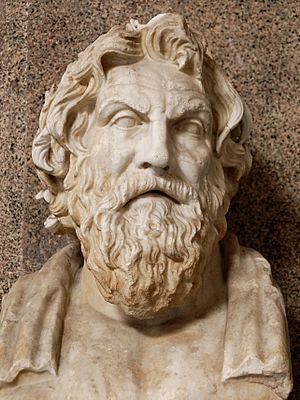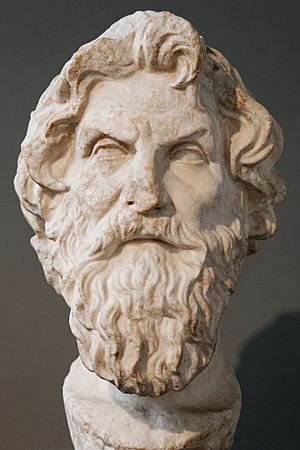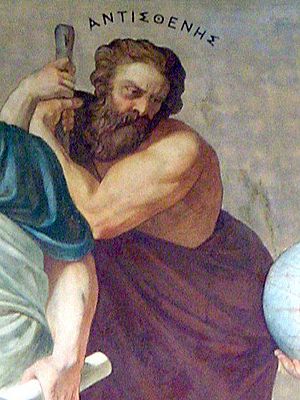Antisthenes facts for kids
Quick facts for kids
Antisthenes
|
|
|---|---|

Portrait bust of Antisthenes, found at the Villa of Cassius at Tivoli, Lazio, 1774 (Museo Pio-Clementino)
|
|
| Born | c. 446 BCE |
| Died | c. 366 BCE (aged approximately 80) Athens
|
| Era | Ancient Greek philosophy |
| Region | Western philosophy |
| School | Cynicism |
|
Main interests
|
Asceticism, ethics, language, literature, logic |
|
Notable ideas
|
Laying the foundations of Cynic philosophy Distinction between sense and reference |
|
Influenced
|
|
Antisthenes (/ænˈtɪsθɪniːz/; Greek: Ἀντισθένης; c. 446 – c. 366 BCE) was an important Greek philosopher. He was a student of Socrates, a very famous thinker.
Antisthenes first studied rhetoric (the art of speaking and writing well) with Gorgias. Later, he became a dedicated follower of Socrates. He took Socrates' ideas about how to live a good life and made them his own. Antisthenes believed in living a simple life focused on virtue (doing what is right). Many people later saw him as the person who started Cynic philosophy.
Contents
Who Was Antisthenes?
Early Life and Education
Antisthenes was born around 446 BCE in Athens. His father was Athenian, but his mother might have been from another land, like Thrace. He once joked about this, saying that even the mother of the gods was from another place!
When he was young, Antisthenes fought in the Battle of Tanagra in 426 BCE. He first learned from the teacher Gorgias. Then, he became a student of Socrates. Antisthenes was so eager to hear Socrates that he walked about 9 kilometers every day. He walked from the port of Peiraeus to Athens, and he convinced his friends to join him. He was even there when Socrates died.
Later Life and Influence
Antisthenes never forgot those who harmed Socrates. He is said to have helped make sure they were punished. He lived until about 365 BCE, when he was nearly 80 years old.
He taught at a place called the Cynosarges. This was a gymnasium (a place for exercise and learning) for Athenians whose mothers were not from Athens. Antisthenes was very excited about Socrates' idea of virtue. He started his own school at Cynosarges. He attracted poorer people because he lived a very simple life and taught simple ideas. He wore a plain cloak and carried a staff and a bag. This simple style became what his followers also wore.
His Writings and Style
A writer named Diogenes Laërtius said that Antisthenes wrote ten books. Sadly, only small parts of these books still exist today. He often wrote in the form of dialogues (conversations). Some of his writings strongly criticized other famous people of his time. For example, he wrote against Plato.
People thought his writing style was clear and elegant. The writer Theopompus even claimed that Plato took many ideas from Antisthenes. The Roman writer Cicero found Antisthenes' works enjoyable. He called him "a man more intelligent than learned." Antisthenes was also known for his clever jokes and sharp comments. He once said he would rather fall among crows than flatterers. He meant that crows only eat the dead, but flatterers harm the living. Two of his speeches, Ajax and Odysseus, are still around.
Antisthenes had a nickname: The (Absolute) Dog.
Antisthenes' Main Ideas

What Diogenes Laertius Said
Diogenes Laertius wrote down some of Antisthenes' favorite ideas. These included:
- Virtue (goodness) can be taught.
- True nobility comes only from being virtuous.
- Virtue is enough for happiness; you don't need anything else but a strong spirit.
- Virtue is about actions, not just words or lots of learning.
- A wise person is self-sufficient and owns all good things.
- Having a bad reputation can be a good thing, like pain.
- A wise person follows the law of virtue, not just human laws.
- A wise person should marry to have children with the most beautiful women.
- A wise person will not avoid love, because only they know who is truly worth loving.
Ethics: Living a Good Life
Antisthenes learned from Socrates that virtue, not pleasure, is the most important goal in life. He believed that everything a wise person does should be perfectly virtuous. He thought pleasure was not only unnecessary but could even be harmful. He once said, "I'd rather be mad than feel pleasure."
However, he probably didn't think all pleasure was bad. He likely meant that pleasures from senses or artificial desires were worthless. He praised pleasures that came "from one's soul" and the joy of a good friendship. He believed the best life was one lived according to virtue. This virtue came from action, and once you had it, you wouldn't lose it. It also protected a wise person from making mistakes. Virtue was connected to reason, but it also needed "Socratic strength" to truly work and bring happiness.
Physics: Understanding God
Antisthenes wrote a book called Physicus about natural philosophy (how the world works). In it, he talked about the nature of the gods. He believed that while people thought there were many gods, there was only one true, natural God. He also said that God is unlike anything on Earth and cannot be understood through any picture or image.
Logic: Ideas and Words
In logic, Antisthenes thought a lot about the "problem of universals." This is about whether general ideas (like "horse-ness") exist, or only individual things (like "this horse"). Antisthenes was a nominalist. This means he believed that only individual things are real. He thought that definitions and statements were either false or just repeating the same thing. For example, he believed you could only say that each individual thing is what it is. You could only describe its qualities, like saying silver is like tin in color.
Because of this, he didn't believe in Plato's idea of perfect "Forms" or "Ideas." Antisthenes famously said, "A horse I can see, but horsehood I cannot see." He thought that saying "a tree is a vegetable growth" was just another way of saying "a tree is a tree."
Philosophy of Language: Meaning of Words
Antisthenes seemed to understand that words have different parts to their meaning. He appeared to separate "a general idea that matches what is said" from "a specific thing that the word points to." This suggests he understood the difference between the "sense" (the meaning) of a word and its "reference" (the actual thing it points to). This idea comes from an old quote that talks about three parts:
- The way we speak (the words themselves).
- The object outside of the words that we are talking about.
- The direct way a word points to something.
Antisthenes and the Cynics
Later on, Antisthenes was seen as the person who started the Cynic school of thought. However, it's not certain if he would have used that name himself. Aristotle, who wrote a generation later, often mentioned Antisthenes and his followers, calling them "the Antistheneans." But Aristotle never used the term "Cynicism."
There are many stories about the famous Cynic Diogenes of Sinope following Antisthenes everywhere. These stories say Diogenes became Antisthenes' loyal student. But it's not clear if the two men ever actually met. Some experts think Diogenes only came to Athens after Antisthenes had died. They believe the stories linking Antisthenes and Diogenes were made up later by the Stoics. The Stoics wanted to show a clear line of teachers from Socrates to Zeno, going through Antisthenes, Diogenes, and Crates. These stories were important to the Stoics to show their philosophical roots.
Other experts disagree. They say the evidence about Diogenes' arrival in Athens is not strong. So, Diogenes might have come to Athens much earlier. It's also possible that Diogenes visited Athens and Antisthenes before he was exiled from his home city, and then returned to Sinope.
Antisthenes definitely lived a very strict and simple life. He developed many of the core ideas of Cynic philosophy. These ideas became a big inspiration for Diogenes and other later Cynics. People said that Antisthenes "laid the foundations of the city" that the Cynics later built.
See also
 In Spanish: Antístenes para niños
In Spanish: Antístenes para niños


